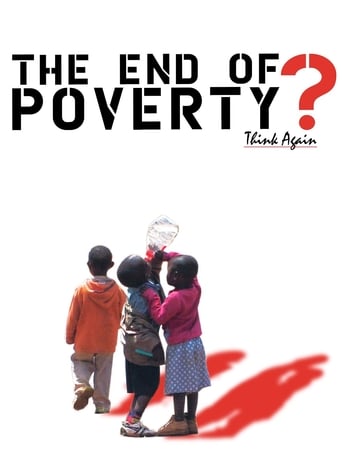

Global poverty did not just happen. Yet the overwhelming magnitude of poverty seems unsolvable. Can we really end poverty within our current economic system?In this award-winning documentary, narrated by Martin Sheen, we see the historical foundation that, for over five centuries, laid the groundwork for today's financial crisis. It began with military conquest, slavery and colonization (often in the spirit of missionary zeal) that resulted in the seizure of land and minerals and in forced labor. Today, the problem persists because of the structuring of debt, trade and tax policies. The "End of Poverty" (2009) reveals a co- dependency in which the southern hemisphere provides cheap resources for the northern hemisphere without a way out of financial indebtedness and towards economic independence. The dependency is necessary to prop up the industrialized nation's standard of living. Read my detailed review at: www.unhealedwound.com (July 27, 2014)!
... View MoreI had the privilege of watching this documentary at the African Film Festival here in New York City at Columbia University. It resonated with me. It was well done and provided vital information and perspective in relation to the way things have been structured. It is very easy to pass judgment on nations that are mired in poverty and resulting civil unrest and other ills, but producer Philippe Diaz brings forward a well put together valid explanation based on history that goes a long way in explaining what has brought them to this point.The documentary takes you around the world to make its points. The long legacy of despair that afflicts nations in "the south" can be found on both sides of the Atlantic and even as far east as Indonesia; in other words, areas that were touched by the colonial grabbing arms of Europe.It is definitely a documentary film I would recommend highly. Some may want to argue about the finer details. Some may want to provide a million different solutions or argue for this solution over that one. I'm not sure the director's intention was to provide solutions as much as he was trying to provide education and awareness in an appeal to conscience which in the end may spark ideas for solutions. Again, I would certainly recommend it and I commend everyone involved in the film's production. Certainly a must see!
... View MoreThe rich started taking advantage of the poor since the 16th century, when is agreed that capitalism was born (I would like to know what brilliant economic system ruled before that). According to the director's view and people interviewed for this documentary, colonialism is responsible for the division between north and south that we see today, and that's when capitalism starts. All the fault falls upon Spain, Portugal, Holland and England (but wasn't the US a former British colony? What about Australia? Maybe they were lucky they did not have any gold).The message is correct: there is a huge gap between rich and poor. The system is a failure, as appropriately states John Perkins. But the director committed the mistake of showing less well-founded words from Amartya Sen and more of labor unionists and most-probably corrupt politicians of emerging countries, that use their speech to manipulate less-educated masses. There is much information with lack of basis in this doc. 1) Brazil does not have 50 million people starving but 13 million, as data from 2004. 2) India and China are not emerging economies because of communist protectionism (as mentions Cliff Cobb); on the contrary, they boomed only after they opened their markets. And 3) Germany is not the largest coffee exporter in the world. Those are things I knew, but because of that, I was skeptical about all the other information in the documentary.Talk about poverty. But use the right data.
... View MoreJust watched it last night at the Athens International Film Festival. This is the kind of documentary I love! It gives you an excellent overview of how the so-called First World has been exploiting the natural resources and human labour of Third World countries for the past 500 years and how the economics and politics behind this brutal exploitation work. This movie is completely different to the Michael Moore-style documentaries that seem to dominate the scene nowadays. Rather than using populism to impress the audience, it presents its case by providing both the opinion of highly respected economists, authors and political advisors, as well as the view of third world people that have been actually experiencing the consequences of the neo-liberal policies. An insight on the methods used by the West (the US in particular) to promote and impose their preferred policies to Third World countries is one of the strongest points of this movie. I am not going to expand on that as I do not want to spoil it for you! In any case, this is a brilliant documentary worth seeing by anyone who has the slightest interest in politics and economics.
... View More